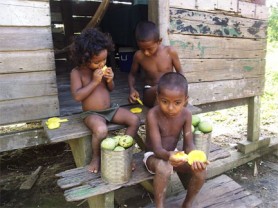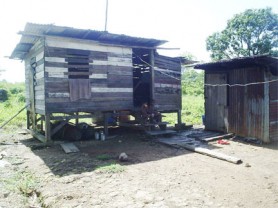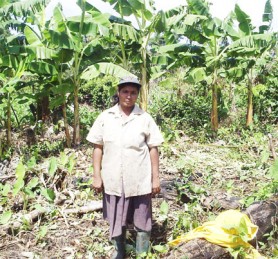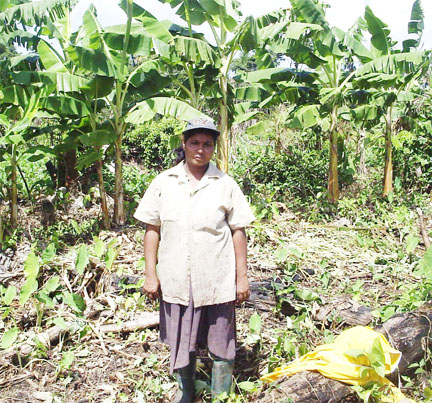Lilawattie Persaud wakes at 3am to prepare breakfast, gets her children ready for school and then treks across muddy land to look for work. ‘If I gat to eat salt and rice, I gon mine me pickney them,’ she says
In a Hog Island field, Lilawattie Persaud reaps eddoes, pulling the tubers from the rich, dark soil. She begins at 8am and labours under the hot sun until 4pm. She is grateful for the work because it means that her children at home will have something to eat.

When the reaping is completed, she will have to look for work elsewhere. Meanwhile, her daughter Kamine, 14, looks after the other children-Immanuel, 8, Joel, 6, and Iona, 3-at their tiny one-room home, about two miles away. On a school-day, they are at home, because the two teachers at the Hog Island Primary School are reportedly away.
It is a struggle, Persaud says, as she takes a rest from pulling out the plants and separating the tuber from the stalks. But she is grateful for any work. “Afterwards me ain’t gat nothing, I gat to stay home,” she told Stabroek News last week.
Her focus is survival. It is a battle that she fights, sometimes with a little help but mostly alone since August 11, when her husband Henry Gibson was discovered dead in a shattered boat, floating off Hog Island. Another man, Jainarine Dinanauth, 45, of Zeelugt, East Bank Essequibo also lay dead in the boat while Dinanauth’s son, Ricky Jainarine was missing. It is a day that the family remembers well and while the children talk about it, Persaud longs for justice. How the men died is still not clear and almost four months after the incident, the families still seek answers.
Like Dinanauth’s family, Persaud believes that rogue Coast Guard ranks were involved in the incident and murdered the men. Persaud said that she has not heard anything from the police about any progress in investigations and this is disheartening. “Me done seh me nah gat justice to get,” she says.

Her focus now is the survival of her family. After Gibson’s death, she said, his relatives wanted to take the children from her but she refused to give them up. “If I gat to eat salt and rice, I gon mine me pickney them,” she declared. And so she wakes at 3am to prepare breakfast, gets them ready for school and then treks across the muddy land to look for whatever work she can get. “Me nah get every-week wuk. Sometime just one day, sometime two day in the week,” she said.
Gibson and Persaud worked together when he was alive. They were in the fields when Dinanauth called on August 10 and asked Gibson to collect him at Parika. He never returned and the bodies were found the next morning. The families were plunged into turmoil. “Some day me just sit down and watch the children and me ah cry…like how the children father gone and left them and he nah come back. The little boy sey how daddy dead; the little girl talk about it; me can’t stick around when them a talk. Me does cry steady,” Persaud said.
Immanuel and Joel are enrolled at the Hog Island Primary School but their attendance is sporadic; sometimes they go only twice a week. The school is two miles away and Persaud said that they have to walk through mud and bushes. She also expressed fears for their safety. The two, along with two other children from the area, usually make the journey. Many times, Persaud says she cannot afford snacks for them.

The children’s school attendance is an issue that concerns not only her but others as well. Still, they understand the struggle that she is enduring. “Since she husband dead, she ain’t really got nobody to depend pon,” Prakash Ramjit called ‘Brown,’ said. He currently employs Persaud at his farm. “At least me a feel sorry fuh she; give she one, one day work because she gat children foh mine,” he added, “Abhe can’t see she punish. We gat foh help she out.”
Ramjit noted that Gibson and Persaud had worked with him before the incident and says he only gives her the “light work,” like planting and reaping. He was concerned about the children’s education, stating that they hardly attend school. “We glad foh see if she get a house out there, like one of the Food for the Poor house, and let the children go to school regular. Without education in this life, you ain’t deh nowhere,” he explained.
Since the incident, Persaud and Dinanauth’s reputed wife, Salimoon Rahaman, have become closer. Gibson was employed by Dinanauth at the time of the deaths. They visit each other when they can and Rahaman is the only person who sometimes helps her, Persaud said. “Anything me short, me does always go to she and if she gat it, she does always tek it and give me.” She stated that she has received little help from anyone else and when she attempted to get into the Public Assistance programme, she was told that it was closed until next year. She noted though that she receives Ministry of Human Services’ vouchers for the children’s school uniforms. To supplement whatever she has, she plants plantains on the dam in front of their home.
While Persaud struggles to provide for her family she also despairs of hearing anything from the police and said that they have not been in contact with her since. “Me husband dead by murder,” she declared pointing out that he sustained a fractured skull and also drowned though his body was in the boat when it was discovered. She believes that the coastguards who were charged with the murder of Bartica gold dealer, Dweive Kant Ramdass, were involved. “Them nah really pressure the people [soldiers] to talk.” She spoke to Guyana Defence Force (GDF) officials once but never heard from them again.
There were signs that the incident was not just an accident. The vessel that rammed the boat did not contact the authorities. Items which Dinanauth had on his person were missing though his licensed firearm was left in his pocket. He had just returned from the interior, where he mined and reportedly had some raw gold on his person along with over $500,000 and a gold watch, all of which was missing when his body was found. His bag has not been found.
And a Maritime Administration Department investigation had found blue paint on the green Coastguard vessel. There were also green paint marks on the blue and white boat that the trio was in. Persons had reported that in the days following August 11, the Coastguard boat was dry-docked for three days and there were reports that a section had been painted over. The blue paint samples from the Coastguard boat were handed over to the police for testing but it is not clear if this has been completed. The GDF had also investigated the boat incident but said this was “inconclusive” though the force’s Board of Inquiry found that the Coastguard vessel – RC12 – was in the Essequibo River at the time that Dinanauth and the two others were in the river.
The autopsy results had shown too that both men had died of asphyxiation due to drowning but that there was also blunt trauma to the head, chest and stomach. However, the bodies were found in the shattered boat and not in the water. And almost four months later, Ricky remains missing.
Last week Stabroek News was informed that the police file on the matter had been sent to the Director of Public Prosecutions for advice to determine whether to lay charges against the three coastguards charged with murdering Ramdass, in the Essequibo River.
Last Wednesday would have been Gibson’s 46th birthday. There was little the family could do and this Christmas will be a “dark” one, Persaud said. It is a struggle in Hog Island but she has nowhere else to go, she adds.
In the heat of the afternoon, an old cap on her head to protect her from the sun, Persaud moves back to the field to continue her toil. When the work is done, she would have to look for more just as she had done again and again in the past four months. There is nothing else she can do, she says.

